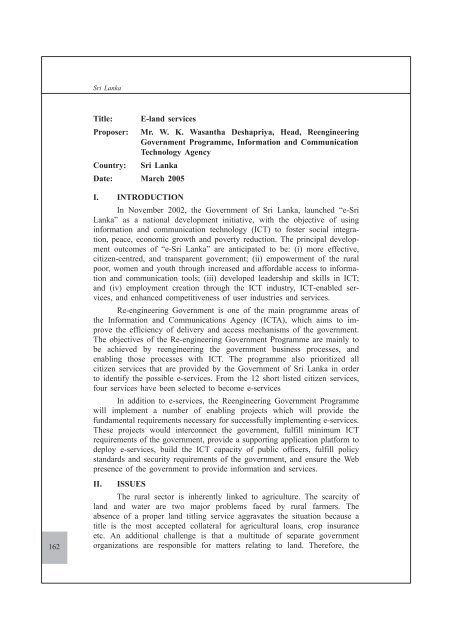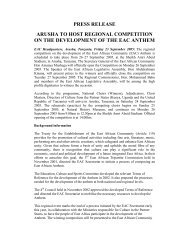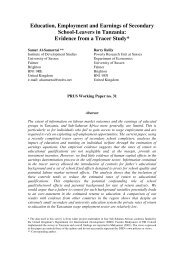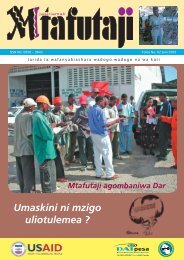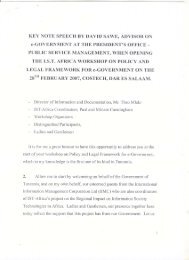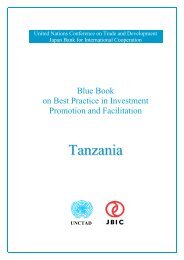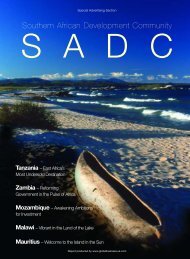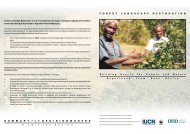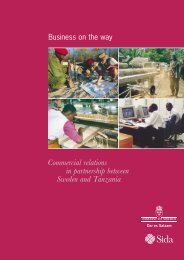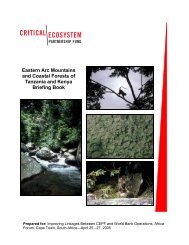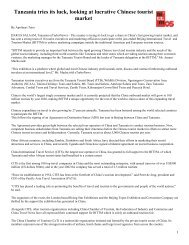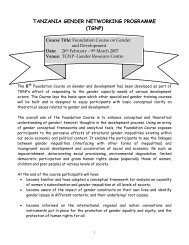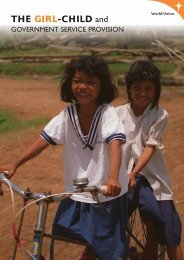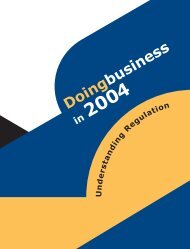Designing e-Government for the Poor - Tanzania Development ...
Designing e-Government for the Poor - Tanzania Development ...
Designing e-Government for the Poor - Tanzania Development ...
You also want an ePaper? Increase the reach of your titles
YUMPU automatically turns print PDFs into web optimized ePapers that Google loves.
162<br />
Sri Lanka<br />
Title: E-land services<br />
Proposer: Mr. W. K. Wasantha Deshapriya, Head, Reengineering<br />
<strong>Government</strong> Programme, In<strong>for</strong>mation and Communication<br />
Technology Agency<br />
Country: Sri Lanka<br />
Date: March 2005<br />
I. INTRODUCTION<br />
In November 2002, <strong>the</strong> <strong>Government</strong> of Sri Lanka, launched “e-Sri<br />
Lanka” as a national development initiative, with <strong>the</strong> objective of using<br />
in<strong>for</strong>mation and communication technology (ICT) to foster social integration,<br />
peace, economic growth and poverty reduction. The principal development<br />
outcomes of “e-Sri Lanka” are anticipated to be: (i) more effective,<br />
citizen-centred, and transparent government; (ii) empowerment of <strong>the</strong> rural<br />
poor, women and youth through increased and af<strong>for</strong>dable access to in<strong>for</strong>mation<br />
and communication tools; (iii) developed leadership and skills in ICT;<br />
and (iv) employment creation through <strong>the</strong> ICT industry, ICT-enabled services,<br />
and enhanced competitiveness of user industries and services.<br />
Re-engineering <strong>Government</strong> is one of <strong>the</strong> main programme areas of<br />
<strong>the</strong> In<strong>for</strong>mation and Communications Agency (ICTA), which aims to improve<br />
<strong>the</strong> efficiency of delivery and access mechanisms of <strong>the</strong> government.<br />
The objectives of <strong>the</strong> Re-engineering <strong>Government</strong> Programme are mainly to<br />
be achieved by reengineering <strong>the</strong> government business processes, and<br />
enabling those processes with ICT. The programme also prioritized all<br />
citizen services that are provided by <strong>the</strong> <strong>Government</strong> of Sri Lanka in order<br />
to identify <strong>the</strong> possible e-services. From <strong>the</strong> 12 short listed citizen services,<br />
four services have been selected to become e-services<br />
In addition to e-services, <strong>the</strong> Reengineering <strong>Government</strong> Programme<br />
will implement a number of enabling projects which will provide <strong>the</strong><br />
fundamental requirements necessary <strong>for</strong> successfully implementing e-services.<br />
These projects would interconnect <strong>the</strong> government, fulfill minimum ICT<br />
requirements of <strong>the</strong> government, provide a supporting application plat<strong>for</strong>m to<br />
deploy e-services, build <strong>the</strong> ICT capacity of public officers, fulfill policy<br />
standards and security requirements of <strong>the</strong> government, and ensure <strong>the</strong> Web<br />
presence of <strong>the</strong> government to provide in<strong>for</strong>mation and services.<br />
II. ISSUES<br />
The rural sector is inherently linked to agriculture. The scarcity of<br />
land and water are two major problems faced by rural farmers. The<br />
absence of a proper land titling service aggravates <strong>the</strong> situation because a<br />
title is <strong>the</strong> most accepted collateral <strong>for</strong> agricultural loans, crop insurance<br />
etc. An additional challenge is that a multitude of separate government<br />
organizations are responsible <strong>for</strong> matters relating to land. There<strong>for</strong>e, <strong>the</strong>


